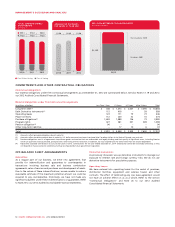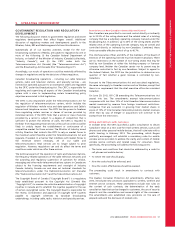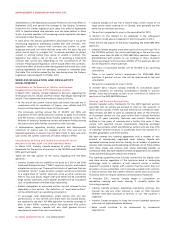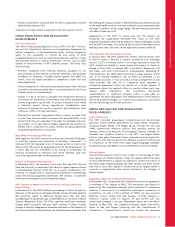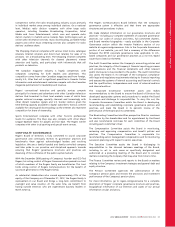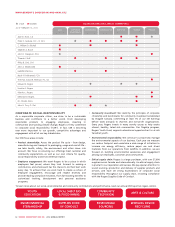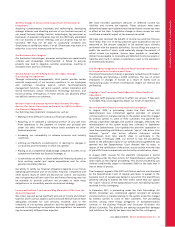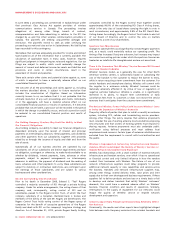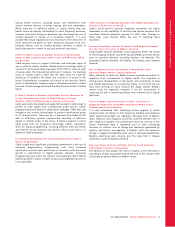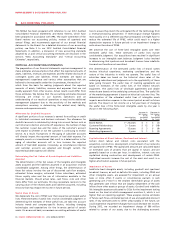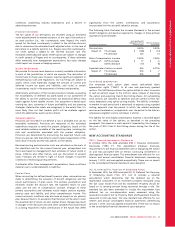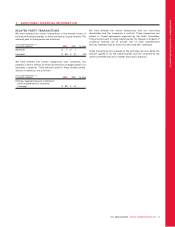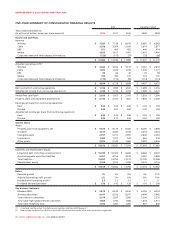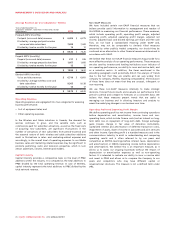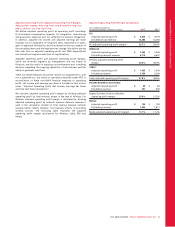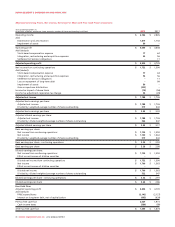Rogers 2012 Annual Report Download - page 70
Download and view the complete annual report
Please find page 70 of the 2012 Rogers annual report below. You can navigate through the pages in the report by either clicking on the pages listed below, or by using the keyword search tool below to find specific information within the annual report.MANAGEMENT’S DISCUSSION AND ANALYSIS
In June 2008, a proceeding was commenced in Saskatchewan under
that province’s Class Actions Act against providers of wireless
communications services in Canada. The proceeding involves
allegations of, among other things, breach of contract,
misrepresentation and false advertising in relation to the 911 fee
charged by us and the other wireless communication providers in
Canada. The plaintiffs are seeking unquantified damages and
restitution. The plaintiffs intend to seek an order certifying the
proceeding as a national class action in Saskatchewan. No liability has
been recorded for this contingency.
We believe that we have adequately provided for income and indirect
taxes based on all of the information that is currently available. The
calculation of applicable taxes in many cases, however, requires
significant judgment in interpreting tax rules and regulations. Our tax
filings are subject to audits, which could materially change the
amount of current and deferred income tax assets and liabilities and
provisions, and could, in certain circumstances, result in the
assessment of interest and penalties.
There exist certain other claims and potential claims against us, none
of which is expected to have a materially adverse effect on our
consolidated financial position.
The outcome of all the proceedings and claims against us, including
the matters described above, is subject to future resolution that
includes the uncertainties of litigation. Based on information
currently known to us, we believe that it is not probable that the
ultimate resolution of any such proceedings and claims, individually
or in the aggregate, will have a material adverse effect on our
consolidated financial position or results of operations. If it becomes
probable that we are liable, a provision will be recorded in the period
in which the change in probability occurs, and such a provision could
be material to our consolidated financial position and results of
operations.
Our Holding Company Structure May Limit Our Ability to Meet
Our Financial Obligations
As a holding company, our ability to meet our financial obligations is
dependent primarily upon the receipt of interest and principal
payments on intercompany advances, rental payments, cash dividends
and other payments from our subsidiaries, together with proceeds
raised by us through the issuance of equity and debt and from the
sale of assets.
Substantially all of our business activities are operated by our
subsidiaries. All of our subsidiaries are distinct legal entities and have
no obligation, contingent or otherwise, to make funds available to us
whether by dividends, interest payments, loans, advances or other
payments, subject to payment arrangements on intercompany
advances. In addition, the payment of dividends and the making of
loans, advances and other payments to us by these subsidiaries are
subject to statutory or contractual restrictions, are contingent upon
the earnings of those subsidiaries, and are subject to various
businesses and other considerations.
We Are Controlled by One Shareholder
Prior to his death in December 2008, Edward S. “Ted” Rogers
controlled a majority ownership of RCI through a private holding
company. Under his estate arrangements, the voting shares of that
company, and, consequently, voting control of RCI and its
subsidiaries, passed to the Rogers Control Trust, of which the trust
company subsidiary of a Canadian chartered bank is trustee and
members of the family of the late Mr. Rogers are beneficiaries. The
Rogers Control Trust holds voting control of the Rogers group of
companies for the benefit of successive generations of the Rogers
family and deals with RCI on the company’s long-term strategy and
direction. As of December 31, 2012, private Rogers family holding
companies controlled by the Rogers Control Trust together owned
approximately 90.9% of the outstanding RCI Class A Voting shares,
which is the only class of issued shares carrying the right to vote in
most circumstances, and approximately 9.8% of the RCI Class B Non-
Voting shares. Accordingly, the Rogers Control Trust is able to elect all
of our Board of Directors and to control the vote on matters
submitted to a vote of our shareholders.
Spectrum Fees May Increase
Changes to spectrum fees could significantly increase Rogers’ payments
and, as a result, could materially reduce our operating profit. The
timing of fee increases (if any) are unknown, but increases may impact
our current accounting policies under which the spectrum licences are
treated as an indefinite life intangible asset and are not amortized.
There Is No Guarantee That Wireless’ Service Revenue Will Exceed
Increased Handset Subsidies
Wireless’ business model, as is generally the case for other North
American wireless carriers, is substantially based on subsidizing the
cost of the handset to the customer to reduce the barrier to entry,
while in return requiring a term commitment from the customer. For
certain handsets and smartphone devices, Wireless will commit with
the supplier to a minimum subsidy. Wireless’ business could be
materially adversely affected if, by virtue of law or regulation or
negative customer behaviour, Wireless is unable, or is significantly
restricted in its ability, to require term commitments or early
cancellation fees from its customers or does not receive the service
revenues that it anticipates from the customer term commitment.
The National Wireless Tower Policy Could Increase Wireless’ Costs
or Delay the Expansion of Wireless’ Networks
The policy affects all parties that plan to install or modify an antenna
system, including PCS, cellular and broadcasting service providers.
Among other things, the policy requires that antenna proponents
must consider the use of existing antenna structures before proposing
new structures and that owners of existing systems must respond to
sharing requests. Antenna proponents must also undertake public
notification using defined processes and must address local
requirements and concerns. Certain types of antenna installations are
excluded from the requirement to consult with local authorities and
the public.
Wireless Is Dependent on Certain Key Infrastructure and Handset
Vendors, Which Could Impact the Quality of Wireless’ Services or
Impede Network Development and Expansion
Wireless has relationships with a small number of essential network
infrastructure and handset vendors, over which it has no operational
or financial control and only limited influence in how the vendors
conduct their businesses with Wireless. The failure of one of our
network infrastructure suppliers could delay programs to provide
additional network capacity or new capabilities and services across
the business. Handsets and network infrastructure suppliers may,
among other things, extend delivery times, raise prices and limit
supply due to their own shortages and business requirements. If these
suppliers fail to deliver products and services on a timely basis or fail
to develop and deliver handsets that satisfy Wireless’ customers’
demands, this could have a material adverse effect on Wireless’
business, financial condition and results of operations. Similarly,
interruptions in the supply of equipment for our networks could
impact the quality of Wireless’ service or impede network
development and expansion.
Concerns about Radio Frequency Emissions May Adversely Affect
Our Business
Occasionally, the media and other reports have highlighted alleged
links between radio frequency emissions from wireless handsets and
66 ROGERS COMMUNICATIONS INC. 2012 ANNUAL REPORT


